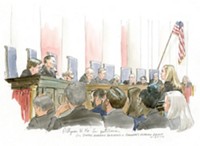Advertisement
Grab your lab coat. Let's get started
Welcome!
Welcome!
Create an account below to get 6 C&EN articles per month, receive newsletters and more - all free.
It seems this is your first time logging in online. Please enter the following information to continue.
As an ACS member you automatically get access to this site. All we need is few more details to create your reading experience.
Not you? Sign in with a different account.
Not you? Sign in with a different account.
ERROR 1
ERROR 1
ERROR 2
ERROR 2
ERROR 2
ERROR 2
ERROR 2
Password and Confirm password must match.
If you have an ACS member number, please enter it here so we can link this account to your membership. (optional)
ERROR 2
ACS values your privacy. By submitting your information, you are gaining access to C&EN and subscribing to our weekly newsletter. We use the information you provide to make your reading experience better, and we will never sell your data to third party members.
Policy
Court Affirms Inventors’ Rights
Intellectual Property: Majority strikes down university’s claim of an inherent right to patents
by Glenn Hess
June 13, 2011
| A version of this story appeared in
Volume 89, Issue 24

The argument that patent rights from federally funded research are automatically vested in universities and not in individual researchers has been rejected by the Supreme Court in a 7-2 decision handed down on June 6. The court’s ruling is expected to have wide impact on how universities and other research institutions craft intellectual property agreements with employees or contractors for inventions that arise from federally funded research.
“Since 1790, the patent law has operated on the premise that rights in an invention belong to the inventor,” Chief Justice John G. Roberts Jr. wrote for the court’s majority. “Although much in intellectual property law has changed in the 220 years since the first Patent Act, the basic idea that inventors have the right to patent their inventions has not.”
The case, Stanford University v. Roche Molecular Systems, concerns the ownership of three patents for a diagnostic test used worldwide to measure the concentration of HIV in patients’ blood plasma. The court’s decision upholds an appeals court ruling that said Stanford shared ownership of the patents with Roche because a Stanford scientist had transferred his rights to the discoveries to a company later acquired by the pharmaceutical giant.
The court rejected Stanford’s argument that it alone owned the technology because the Bayh-Dole Act, a 30-year-old federal law, vests the patent rights from federally funded research in universities and not in individual researchers. The National Institutes of Health funded some of Stanford’s research related to the HIV measurement technique.
“We are disappointed with the ruling by the Supreme Court in this case, but will move forward to protect the interests of all parties in inventions created with federal funding, including the interests of the federal government and companies that license technology from Stanford,” Debra Zumwalt, the university’s general counsel, said in a statement.
Roberts ruled that under Bayh-Dole, federal contractors, including universities, may “elect to retain title” to discoveries. But he said the statute “does not vest title” automatically in the universities. “Nowhere in the act are inventors expressly deprived of their interest in federally funded inventions,” Roberts wrote in a 15-page opinion. He added that universities could secure their claim on the inventions of their employees “with an effective assignment.”
The decision clarifies that Bayh-Dole does not offer special breaks for research institutions and other federal contractors, says Charles Steenburg, an attorney at the Boston-based intellectual property law firm Wolf Greenfield.
“This is significant for universities, which sometimes face challenges when trying to get tenured professors and other luminaries to sign assignment agreements,” Steenburg tells C&EN.
Patent experts say it is unlikely that the Supreme Court’s ruling will in any way impair federally funded research programs, but it will force research institutions to take extra precautions to preserve their patent rights in the future.




Join the conversation
Contact the reporter
Submit a Letter to the Editor for publication
Engage with us on Twitter